Travis Mathews is easily one of my favorite people. Whether it’s his documentary work like In Their Room or his narrative fiction work like I Want Your Love, Mathews is getting at the emotional core of a new generation, and reflecting it back for everyone else to see.
Thanks to the magic of the internet, I recently had a chance to sit down with Mathews and ask him a few questions about his work. By “sit down” I mean “email” of course.

For the past few years, your work—whether it be fiction or non-fiction—has focused on documenting the intimate lives of gay men. Why do you think that’s so important to do right now?
We’re living in an unprecedented time of flux, especially as gay men who are — in many cases — coming of age in a broadening world of social acceptance and with new technologies to connect us. I’m interested in what this means for intimacy among gay men and I’m interested in intimacy more generally speaking. In most cases gay intimacy and gay sex have been couched as something lacking of emotion, primarily hypermasculine, and hard. Or, it’s been coy and sweet and lacking of anything hot and all that sexual. I feel like we’ve advanced enough to start bringing something more integrated together that can be as flawed and messy as it is hot and playful.
We’re living in a very particular time that’s not quite sorted itself out. I’m thinking of the exponential rise in gay rights coupled with technology in particular. As early adopters, gay men have embraced new technologies as a way to connect, find love, sex, intimacy. But these are all new advances that are moving fast and furiously away from how we used to connect while pointing toward how we might in the future. It’s an in-between moment in time and in-between moments often say more about someone or a group than the past/future hugging either end. It’s where people are moving away from or toward something and what you choose to do there which is infinitely more interesting to me.
Now that you’ve had a few years of this under your belt, and you’ve started taking these films around the world and showing them to the public, what has the response been?
I think a lot of guys (and a surprising number of women) are hungry for representations that they can relate to which also feel 3-Dimensional. We very rarely see/hear men being vulnerable as a show of strength and humanity so guys are responding to that. That’s my goal and that’s what I hear largely. And I think people new to my work are surprised by how non-porny it is.
You’ve worked with different producers in your various projects, including NakedSword for you latest round of projects. What was it about doing a Kickstarter campaign that appealed to you for In Their Room – London?
Basically, I wanted to start owning — at least some of — my work and the time frame suggested that I’d have better luck with a 30 day Kickstarter campaign than I would hustling for private financing with such a short window of time. With three weeks left, this remains to be seen!
I’m wanting to go to London because the first preview screening of I Want Your Love is playing there on April 12. I’ve also been a self-diagnosed anglophile since high school so there’s a sweet excitement when thinking of London in general. Similar to how I went to Berlin for the Berlin Porn Festival in 2010, I want to make the I Want Your Love screening as an opportunity to do a new In Their Room episode.
This changing time I’m riffing on is just as relevant with means of production and distribution for artists. It’s a wild wild west of sorts and everyone is scrambling to figure out what gets viewers and dollars for new work. I’m certainly open and eager to work with producers but the chance to diversify ownership of my work feels smart and exciting right now.

The exploration of gay men’s stories has always been an interesting struggle. What started as independent endeavors that still had to be couched in the mores of the time. Over the past few decades that morphed into something corporate, where the public is served happy couples wearing sweaters and smiles while the in-group is served waxed and pampered sex objects. The reality, as you know, is a lot more complex. I think there’s more of a demand, within the culture, for realistic representations.
Do you think the proliferation of new media distribution technologies are making it easier to return to that independent nature, where more people can tell their stories the way they want to?
Of course! I don’t think there’s any debate, it’s happening. There’s a gazillion people — gay and otherwise — making their own media and starting to tell their own stories. Streaming video, people’s increasing willingness to sit in front of their computers to watch more than three minutes, and accessible production tools — like the Canon 5D — have really empowered people all over with the idea that they can tell their own stories. Representations of queer life are just going to be more numerous because of this. It’s a good thing.
Do you think that freedom is going to inspire people to share their real stories, or do you think we’ll continue to push forward the fantasies that we want to see, or that we want others to see?
It’s a both/and kind of scenario. People are going to tell stories that are deeply personal and affecting to micro-demographics and others are going to aim for glossy fantasies that reach the masses. What’s different from the past — and I think this can be said for all cultural trends — is that we’re sort of in a moment that’s “everything all of the time” where no one trend is dominant. Simon Reynolds book Retromania talks about this in a way that’s dead on, compelling, but a little despairing at times.
Your early documentary work focused on the body issues of gay men. What role do you think do you think those issues play in your newer work?
There’s a pretty clear throughline in my work that focuses on gay men talking about, showing, “doing”, braving and skirting around intimacy issues. If you look at my first documentary, Do I Look Fat?, it’s focusing on a group of gay men who are being quite brave and candid about vulnerable issues that have impacted the way they see themselves and their bodies, issues that have a great impact on their relatedness to other men. I’ve continued to do that with the In Their Room series and with I Want Your Love. I approach it from a different angle, but it’s all still under the same tent. As I started to make work that involved sex and naked bodies, I was clear from the start that these would be representations that — to the best of my ability — didn’t harm people with how unattainable and unrelatable they were. Just like with Do I Look Fat? my hope is that gay guys watching any of my recent work will have moments of “I feel that too” or “that’s happened to me” in a way that’s inclusive, comforting, while also entertaining.
If you had the chance to sit down with each and every one of your potential Kickstarter investors, what would you tell them?
I’d want them to know that while I love what I do, it’s more than my “interesting project”. There’s a lot of value in these video portraits and small stories of modern gay life that I’m telling. Ultimately, I think it’s important to the gay community in terms of creating representations that many gay men can relate to but also in terms of historical documentation of the zeitgeist.
I suppose everyone thinks that the moment they’re living in is special, but we are in an unprecedented moment where gay visibility/acceptance is coinciding with technological tools that have completely redressed the way gay men look for, find, and deal with connection, intimacy, loneliness. To me, we’re in a very in-between moment that’s going to look like a transitional time when we have the value of hindsight. And in-between moments are what I love capturing. Whether it’s an in-between moment during an afternoon, or an in-between moment in one’s life, or an in-between moment with an entire community’s growth, I think it’s a rich thing to witness, and an important moment to capture. These are the moments that are often edited out of films, but it’s really where the magic is to my eye.
Mathews is halfway through his Kickstarter campaign, and he’s still looking to raise another $6000. Check out his video and then dig deep into your pockets.
In Their Room – London | Show Your Support


